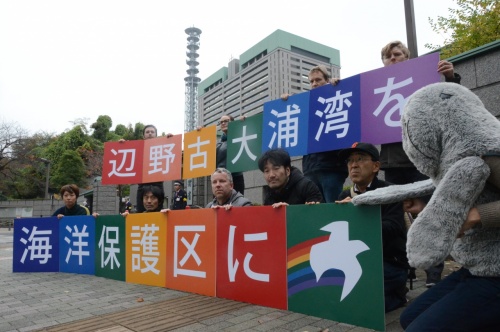Greenpeace requests halt to Henoko relocation project at the Ministry of Defense

Greenpeace Japan’s staff and supporters request a halt to the Henoko relocation project at 9:30 a.m. on November 25 in front of the Ministry of Defense.
November 25, 2015 Ryukyu Shimpo
At the Ministry of Defense on November 25, the international NGO Greenpeace Japan requested environmental protection in Henoko and Oura Bay, and a halt to construction of a relocation facility for U.S. Marine Corp Air Station Futenma. The NGO submitted 28,759 signatures collected from abroad, addressed to Prime Minister Shinzo Abe.
Staff and supporters of Greenpeace Japan showed their opposition to the Henoko relocation project by carrying placards in front of the Ministry of Defense with slogans such as “Save the dugongs,” or “Let’s make Henoko and Oura Bay into ocean sanctuaries.”
During their appeal, the staff of Greenpeace Japan asked the Japanese government about how it is dealing with the issue in which members of the Environmental Oversight Committee (Ministry of Defense) were found to have received donations from companies contracted to do work related to construction of the replacement facility, and about the results of the government’s investigation into the issue. Greenpeace Japan also asked the Ministry of Defense about its cooperation the Ministry of the Environment concerning environmental protection.
A Ministry of Defense official claimed that the Environmental Oversight Committee and its environmental assessments are legitimate by saying “[The donations] are a regular part of cooperative efforts between industry and academic research.” The Ministry further responded to Greenpeace’s inquiry with, “We are communicating back and forth [with the Ministry of the Environment] concerning dugongs.” It failed, however, to give a clear answer in relation to other endangered or scarce species.
Following the appeal Tamara Stark of Greenpeace said she wants to draw attention to the fact that in Oura Bay there is a healthy environment for coral reefs and other varieties of animals aside from dugongs.
Greenpeace Oceans Campaigner Kazue Komatsubara pointed out that the Ministry of Defense’s back-and-forth with the Ministry of the Environment is not adequate, and the legitimacy of the environmental assessments is also questionable.
(English translation by T&CT and Erin Jones)
Previous Article:Kijoka elementary school children find swan goose
Next Article:Japanese government responds positively to appeal for Okinawa war damages to be included in nationwide report
[Similar Articles]
- Seventeen groups issue a statement to seek the environmental protection of Henoko and Oura Bay based on the Ramsar Convention
- Henoko Environmental Oversight Committee specialist says Okinawa dugong is “highly likely extinct”; large-scale survey needed
- Greenpeace calls for Oura Bay to be made an ocean sanctuary
- Two missing dugongs may substantiate OPG claim that Henoko construction harms environment
- Okinawa Defense Bureau confirms traces of dugongs eating seaweed in the sea around Henoko
 Webcam(Kokusai Street)
Webcam(Kokusai Street)


